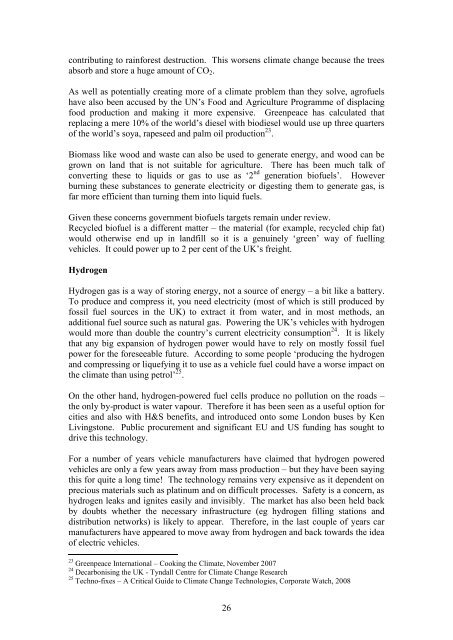Sustainable Transport and the Environment Guide - Unite the Union
Sustainable Transport and the Environment Guide - Unite the Union
Sustainable Transport and the Environment Guide - Unite the Union
Create successful ePaper yourself
Turn your PDF publications into a flip-book with our unique Google optimized e-Paper software.
contributing to rainforest destruction. This worsens climate change because <strong>the</strong> trees<br />
absorb <strong>and</strong> store a huge amount of CO 2 .<br />
As well as potentially creating more of a climate problem than <strong>the</strong>y solve, agrofuels<br />
have also been accused by <strong>the</strong> UN’s Food <strong>and</strong> Agriculture Programme of displacing<br />
food production <strong>and</strong> making it more expensive. Greenpeace has calculated that<br />
replacing a mere 10% of <strong>the</strong> world’s diesel with biodiesel would use up three quarters<br />
of <strong>the</strong> world’s soya, rapeseed <strong>and</strong> palm oil production 23 .<br />
Biomass like wood <strong>and</strong> waste can also be used to generate energy, <strong>and</strong> wood can be<br />
grown on l<strong>and</strong> that is not suitable for agriculture. There has been much talk of<br />
converting <strong>the</strong>se to liquids or gas to use as ‘2 nd generation biofuels’. However<br />
burning <strong>the</strong>se substances to generate electricity or digesting <strong>the</strong>m to generate gas, is<br />
far more efficient than turning <strong>the</strong>m into liquid fuels.<br />
Given <strong>the</strong>se concerns government biofuels targets remain under review.<br />
Recycled biofuel is a different matter – <strong>the</strong> material (for example, recycled chip fat)<br />
would o<strong>the</strong>rwise end up in l<strong>and</strong>fill so it is a genuinely ‘green’ way of fuelling<br />
vehicles. It could power up to 2 per cent of <strong>the</strong> UK’s freight.<br />
Hydrogen<br />
Hydrogen gas is a way of storing energy, not a source of energy – a bit like a battery.<br />
To produce <strong>and</strong> compress it, you need electricity (most of which is still produced by<br />
fossil fuel sources in <strong>the</strong> UK) to extract it from water, <strong>and</strong> in most methods, an<br />
additional fuel source such as natural gas. Powering <strong>the</strong> UK’s vehicles with hydrogen<br />
would more than double <strong>the</strong> country’s current electricity consumption 24 . It is likely<br />
that any big expansion of hydrogen power would have to rely on mostly fossil fuel<br />
power for <strong>the</strong> foreseeable future. According to some people ‘producing <strong>the</strong> hydrogen<br />
<strong>and</strong> compressing or liquefying it to use as a vehicle fuel could have a worse impact on<br />
<strong>the</strong> climate than using petrol’ 25 .<br />
On <strong>the</strong> o<strong>the</strong>r h<strong>and</strong>, hydrogen-powered fuel cells produce no pollution on <strong>the</strong> roads –<br />
<strong>the</strong> only by-product is water vapour. Therefore it has been seen as a useful option for<br />
cities <strong>and</strong> also with H&S benefits, <strong>and</strong> introduced onto some London buses by Ken<br />
Livingstone. Public procurement <strong>and</strong> significant EU <strong>and</strong> US funding has sought to<br />
drive this technology.<br />
For a number of years vehicle manufacturers have claimed that hydrogen powered<br />
vehicles are only a few years away from mass production – but <strong>the</strong>y have been saying<br />
this for quite a long time! The technology remains very expensive as it dependent on<br />
precious materials such as platinum <strong>and</strong> on difficult processes. Safety is a concern, as<br />
hydrogen leaks <strong>and</strong> ignites easily <strong>and</strong> invisibly. The market has also been held back<br />
by doubts whe<strong>the</strong>r <strong>the</strong> necessary infrastructure (eg hydrogen filling stations <strong>and</strong><br />
distribution networks) is likely to appear. Therefore, in <strong>the</strong> last couple of years car<br />
manufacturers have appeared to move away from hydrogen <strong>and</strong> back towards <strong>the</strong> idea<br />
of electric vehicles.<br />
23 Greenpeace International – Cooking <strong>the</strong> Climate, November 2007<br />
24 Decarbonising <strong>the</strong> UK - Tyndall Centre for Climate Change Research<br />
25 Techno-fixes – A Critical <strong>Guide</strong> to Climate Change Technologies, Corporate Watch, 2008<br />
26
















